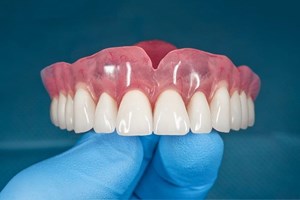Is there a link between dementia and missing teeth?
Published: 21/12/2021
Research published in the Journal of the American Medical Directors Association (JAMDA) has identified a potential risk factor for dementia that can be found in the mouth.
The article, ‘Dose-Response Meta-Analysis on Tooth Loss with the Risk of Cognitive Impairment and Dementia’, revealed that each missing tooth a person has increases their risk of dementia by 1.1 per cent.
People missing all of their teeth have 40 per cent higher risk of being diagnosed with dementia and have a 54 per cent increased risk of cognitive impairment. However, the research also found that this effect was reduced by the installation of dentures.
The study’s findings concluded that “moderate-quality evidence suggested tooth loss was independently associated with cognitive impairment and dementia; risk of diminished cognitive function increased with incremental numbers of teeth lost.
“Furthermore, timely prosthodontic treatment with dentures may reduce the progression of cognitive decline related to tooth loss.”
Reporting on the study, Express highlighted that “The researchers note that younger people are less likely to suffer from both missing teeth and dementia.
“They describe that it is harder to maintain good oral healthcare in later life when people are increasingly dependent on others for self-care.
“Cognitive decline may also worsen hygiene, leading to the loss of teeth.
“Other research has examined the role of other mouth diseases, which can be worsened by loss of teeth, that may increase the risk of dementia.”
The media outlet also noted that “Some research has looked at the impact dental health to see if they produce a change in dementia rates.
“One study published in the British Journal of Psychiatry found that fluoridated drinking water is linked to a reduced risk of dementia among people who drink it.
“Water fluoridation is the practice of artificially adding fluoride to tap water supplies to reduce rates of tooth decay.
“The decision to do this is devolved to local authorities, although some areas have naturally high levels of fluoride.”
Author: N/A











.jpg?width=150&height=100&scale=canvas)

